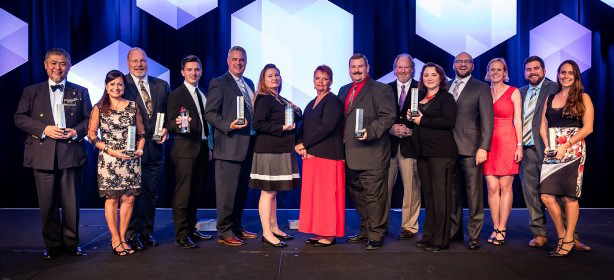 This year’s REME Awards winners.
This year’s REME Awards winners.
SAN DIEGO—From class-A service to a focus on tenants and their wellness, the 2016 REME Awards for Real Estate Management Excellence winners strive for excellence. The announcement of the recipients was one of the highlights of the IREM Fall Conference at the inaugural gala dinner. Celebrating excellence in real estate management, the awards recognized real estate management companies and individual practitioners for innovative, leading-edge, business practices and initiatives and sharing successful initiatives and fostering further innovation within the real estate management industry, locally and globally.
The winners were: ARM of the Year—Nicole Helton, ARM, Alliance Residential LLC, AMO, Riverside, CA; CPM of the Year—Rita Hernandez, CPM, Brickman, San Francisco, CA; AMO of the Year—Blanton Turner, AMO, Seattle, WA, Executive CPM: Barry G. Blanton, CPM; AMO of the Year—Michaels Management Services, Inc., AMO, Marlton, NJ, Executive CPM: Heather L. Plummer, CPM; Corporate Innovation—Cushman & Wakefield NorthMarq, AMO,
Bloomington, MN, Winning Initiative: Their recently overhauled, bi-annual Compass Report, the Twin Cities’ most frequently cited research report covering the CRE market; Corporate & Social Responsibility—Astar/Cardinal Capital Management, West Allis, WI, Winning Initiative: Implemented “Growing Community through Gardening,” a health and wellness initiative that provides a way for residents to eat healthier and enjoy socialization, recreation and exercise all at the same time; Workplace Environment: Employee & Leadership—Veritas Investments, San Francisco, CA, Winning Initiative: Their “Collaborative Company” initiative has instilled a firm-wide focus on experience, resulting in empowered and engaged employees; Workplace Environment: Sustainability Programs—SL Green Realty Corp., New York, NY, Winning Initiative: In concert with tenant Viacom, implemented an energy efficiency retrofit at their global headquarters at 1515 Broadway in New York, resulting in energy reduction of 15% and counting, and collaboration influence of other key tenants; Presidential Award—Special recognition to Asset Build, Tokyo, Japan, Winning Initiative: Following the major earthquake in Kumamoto, assembled a building-emergency risk-assessment team in conjunction with the IREM Japan Chapter to inspect 114 damaged buildings over two days to determine whether they were safe to be re-entered.
GlobeSt.com spoke exclusively with representatives from four of this year’s winners—Evin Epstein, sustainability administrator, SL Green; Justin Sato, COO, Veritas; Lisa Dongoske, EVP of asset and occupier services for Cushman & Wakefield NorthMarq AMO; and Erich Schwenker, president of Astar/Cardinal Capital Management—to find out their secrets to success.
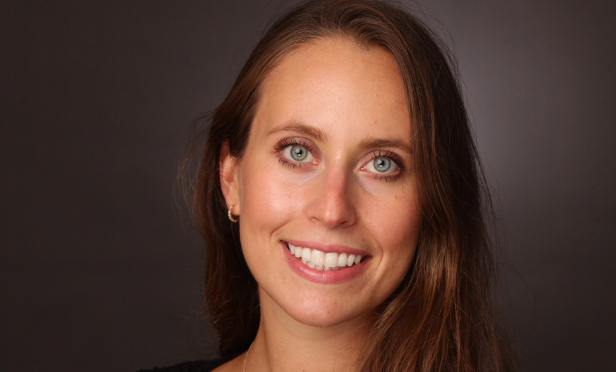 Epstein: “By solidifying a strong tenant-landlord partnership, SL Green and Viacom were able to transform 1515’s operational efficiency.”
Epstein: “By solidifying a strong tenant-landlord partnership, SL Green and Viacom were able to transform 1515’s operational efficiency.”
GlobeSt.com: Why do you believe you were winners in your respective REME categories?
Epstein: First, the scale of the project, which was 1.3 million square feet. Second, the scale of the investment, which was $130 million (this was stipulated in Viacom’s lease renewal). There were nine major efficiency projects: central plant upgrades, enhanced BMS controls, AHU upgrade, LED retrofit, stack mitigation upgrade, cooling tower rebuild, bathroom refurbishment, a 7th-floor terrace garden and a green roof. We achieved overall reduction of building energy consumption by 15%/
The most notable aspect of 1515 Broadway’s sustainability program that can be scaled to other projects is the effectiveness of tenant-landlord collaboration in project implementation and execution. While in renewal negotiations with SL Green, Viacom leveraged its position to ensure that its headquarters would meet exemplary sustainability standards. Specifically, financial commitments to sustainability projects were stipulated in Viacom’s lease renewal. SL Green’s receptiveness to Viacom should be replicated across the industry. This project proves that sustainability is not only a way to improve the bottom line and attract investors, but has grown into a tenant expectation and a social responsibility. By solidifying a strong tenant-landlord partnership, SL Green and Viacom were able to transform 1515’s operational efficiency.
Sato: We take great pride in being awarded for our workplace environment, and it’s something we work at every day. From the beginning, we felt strongly that we couldn’t lose the entrepreneurial, small-firm culture that our CEO and leadership team envisioned when he started the company in 2007. We believe part of our success is our cross-fertilization of our roots in customer service and in technological innovation. We’ve also implemented a cross-organization approach, which helps open the lines of communication, and a strong information-sharing culture across our fully integrated services. We feel these practices keep our employees engaged, our leadership energized and our company well positioned for future growth.
Dongoske: We believe the Compass Report redesign project won the Corporate Innovation award because we executed a major overhaul an already market-leading, legacy product. Looking to the future, we had the foresight to realize that to keep our marketing-leading position on providing leading Twin Cities CRE market intelligence for our clients, we needed to redesign the report to resonate with today’s readers with more visual storytelling, reduced text and easier-to-read narratives. The project required a great deal of time, strategy and team collaboration. We believe this project will continue to make an impact on the overall Twin Cities business community since its breaks down complex commercial real estate market intelligence and helps our clients create value, solve problems and seize market opportunities.
Schwenker: As an innovative property-management company and agent/owner, Astar/Cardinal Capital Management felt its Growing Community Through Gardening initiative was a program worth nominating. Initially visualized as an opportunity for residents to participate in growing and sharing garden vegetables with their fellow residents, this program has evolved into much more. By utilizing corporate donations and volunteer manpower, residents are able to plan, tend, harvest, cook, compost and socialize in an effort to build healthier lives and enjoy fresh produce in their own backyards. The initiative perfectly fit the requirements for the Corporate and Social Responsibility REME Award.
GlobeSt.com: What does it take to stand out from the crowd in property management today?
Epstein: Partnership with a tenant (Viacom) and having the same shared vision for the environment, energy saving, sustainability and functional workplace for employees; class-A service; tenant experience; a focus on tenant wellness/amenities; executive-level commitment to the tenant experience, sustainability and social responsibility; engagement in local community (SLG hosted three community park clean-up events to celebrate Earth Day 2016) and City initiatives (SLG participated in the New York City Mayor’s Zero Waste Challenge with two tenants and will participate in the New York City Mayor’s Carbon Challenge in 2017 with additional tenants across 6.9 million square feet).
Sato: Our “Ambassador Resident Managers” are employees of Veritas who are also resident managers in our buildings. Working within our corporate offices and managing a building offers these managers and the company a unique, up-close and personal viewpoint of our properties, our residents and the issues we all face on a day-to-day basis. Of our roughly 100 resident managers, more than 30 are Ambassador RMs, which is a large percentage that gives us a wealth of information from the front lines. Our Ambassador RMs are integrated into every department in the company, giving us the key insights that set us apart.
Another edge Veritas has over its competitors is in our partner services. By bringing in strategic partners and giving everyone easy access to necessary services helps our new guests acclimate much more quickly and feel more at home. Partners like Zipcar, Scoot, Luxe and Crunch Fitness help to simplify life for our residents and create a sanctuary where all their needs are met in a very small radius.
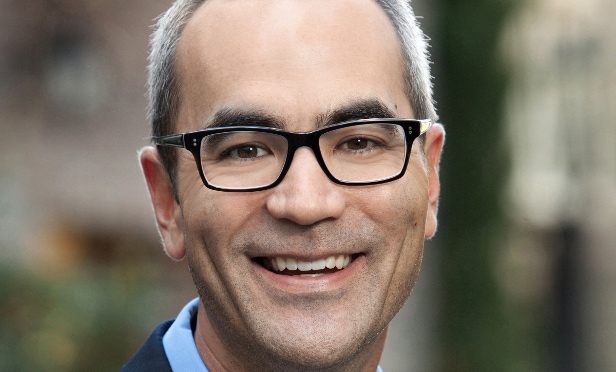 Sato: “We discovered fairly early on that typical office structures and siloed departments were not efficient for us to grow and succeed at the pace we envisioned.”
Sato: “We discovered fairly early on that typical office structures and siloed departments were not efficient for us to grow and succeed at the pace we envisioned.”
Dongoske: The property-management industry continues to improve and become more competitive, and we feel we continue our marketing-leading position by providing excellent client service, hiring and retaining exceptional talent and staying in front of trends and innovation. We also cultivate a collaborative culture, where a manager can feel comfortable doing his or her job, regardless of rank or experience.
Schwenker: Innovation, professionalism, B.I.D. involvement, brainstorming with local redevelopment groups, courage to take risks and corporate philosophy and leadership are all necessary to stand out from the crowd in property management. Astar/Cardinal Capital Management continues to strive to provide services and resources for residents to sustain occupancy while placing the emphasis on improving the quality of residents’ living environment.
GlobeSt.com: What mistakes have you made that have helped you learn to become stronger leaders?
Epstein: The essential lesson learned is that implementing sustainable projects in an office space is not a “one-size-fits-all” solution. Together, SL Green and Viacom strategically identified the opportunities that were possible given its unique project boundaries. SL Green was then able to optimize those opportunities and successfully implement an effective efficiency program that yields energy and cost savings. SL Green and Viacom overcame the project challenges by taking an incremental instead of a top-down approach to Viacom’s sustainability initiatives. Specifically, since LEED-EB was not feasible at the time of the project—This building’s performance is challenged by high energy occupancies such as TV Studios, a large Broadway Theatre, a concert venue, restaurant, and flagship retail. Because of this we have not yet been able to obtain the minimum required ENERGY STAR score necessary for LEED, but we have managed to increase our score 13 points to date—the awardee instead focused on achieving LEED-CI certifications on five floors. Additionally, the awardee initiated the retrofit on the 26th-floor data center to reduce energy consumption. The strategy was to effect sustainable changes through targeted opportunities that greatly enhanced Viacom’s overall approach to efficiency.
Sato: With the explosive growth we’ve enjoyed, staffing and corporate culture can become difficult to manage. We discovered fairly early on that typical office structures and siloed departments were not efficient for us to grow and succeed at the pace we envisioned. We began working on department organization that would foster better communication and allow us to be more responsive to our residents. We are now in the process of grouping people by project in a neighborhood fashion with intelligent collaboration rather than by department. We’re finding this structure leads to positive team building, creative problem solving and improved transparency.
Dongoske: Our company has found that, without fail, it’s a mistake to try and do everything on your own. We encourage a very team-oriented model of problem solving that encompasses all departments and service lines at Cushman & Wakefield NorthMarq, creating opportunities for our employees to focus on the issues and processes they know best. This culture of collaboration and empowerment creates tremendous value for our clients, as well as our company.
Schwenker: Our firm has grown rapidly over the last 14 years, and at times all the wagons in the train haven’t moved at that same pace. While the company outpaced the property-management industry by adopting cloud computing in 2009, the company’s website was not used to its full potential: neither content nor host technology were updated frequently enough, which led to a lack of communities’ awareness of us and our initiatives.
Becoming a stronger leader often happens after admitting you’ve underperformed in an area and then taking the proper steps to remedy the situation. Now, we have selected a new website-hosting software, designed a new look and logo, developed the stories about our housing and programs (including Growing Community Through Gardening) and plan on publishing the new site in early December. It’s now a site that will tell our story with a contemporary look and with technology that scales from mobile to desktop. It reaches out to multiple users, including investors, lenders, governmental bodies and regulatory agencies. The new website also functions as a fundraising tool to sustain important social initiatives.
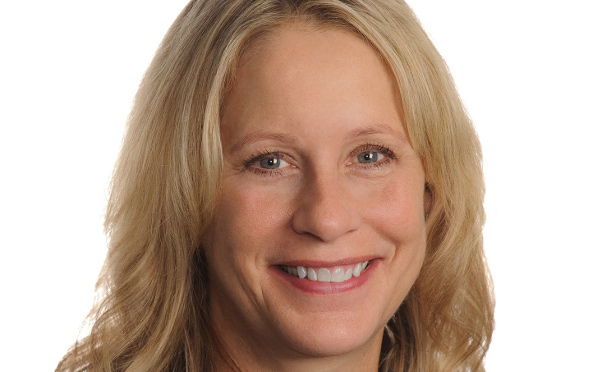 Dongoske: “We cultivate a collaborative culture, where a manager can feel comfortable doing his or her job, regardless of rank or experience.”
Dongoske: “We cultivate a collaborative culture, where a manager can feel comfortable doing his or her job, regardless of rank or experience.”
GlobeSt.com: What new strategies will you take into 2017 to continue to excel at what you do?
Epstein: The investments made at 1515 have made it a flagship building both within SL Green’s portfolio and within New York City. SL Green’s investments in energy efficiency at this property have also shaped the way the sustainability team approaches other flagship tenants. Since our partnership with Viacom, the team has collaborated with other key tenants including the NHL, Hess, Prudential and Bloomberg.
We will continue to align operational strategy with New York City (80% greenhouse-gas reductions by 2050, called “80×50”) and international (i.e., Paris Climate Agreement) goals.
Sato: At Veritas, we’re looking beyond 2017 and have set goals for ourselves well into the future. One of those goals is to more than double our business by the year 2020. This aggressive growth will require heavy investment in technology, innovation and resources, and it will take not only increases in our work force, but training and promoting of our current employees to develop the necessary leadership to scale intelligently. Growth is going to be the key to our story and preserving our unique culture is paramount, so we spend a great deal of time planning wisely for the future.
Dongoske: We’re a company that constantly focuses on innovation, introducing new products or services or improving existing initiatives. Great ideas come from a variety of sources—new employees, tenured employees, clients, vendors, and other outside partners—and we also listen closely to find ways we can improve our service offering. For example, we are launching a new software system in 2017 that will be a user-friendly web tool that allows clients, property managers and vendors to access real-time data on several features to any particular client’s portfolio of properties. We are excited to continue finding new solutions that add value to our clients and help our employees do their jobs even better.
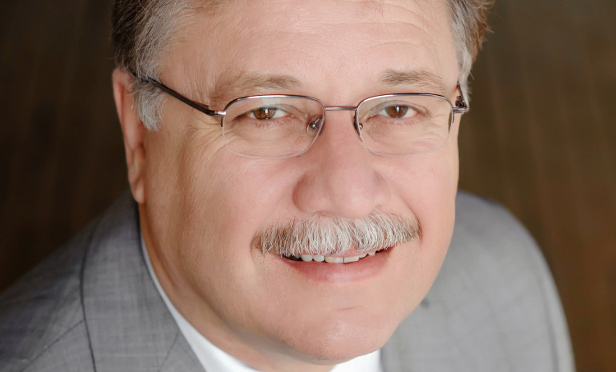 Schwenker: “Becoming a stronger leader often happens after admitting you’ve underperformed in an area and then taking the proper steps to remedy the situation.”
Schwenker: “Becoming a stronger leader often happens after admitting you’ve underperformed in an area and then taking the proper steps to remedy the situation.”
Schwenker: We are taking a renewed focus on technology and advanced technologies such as artificial intelligence to aid in the management of our large portfolio. This will allow us to identify possible correlations between expenses, weather patterns and regional practices that might not be readily evident from traditional monthly and annual reporting methods. We are adding technology training for staff to aid them in their daily work and provide them with more efficient ways to assist applicants and residents. We are also working to eliminate any information silos within the company that slow down information retrieval, so staff can access data and information in a timely and meaningful manner.





 IREM
IREM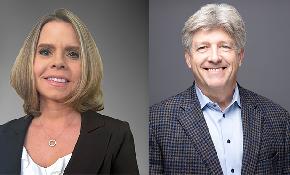











 Copyright © 2024 ALM Global, LLC. All Rights Reserved.
Copyright © 2024 ALM Global, LLC. All Rights Reserved.